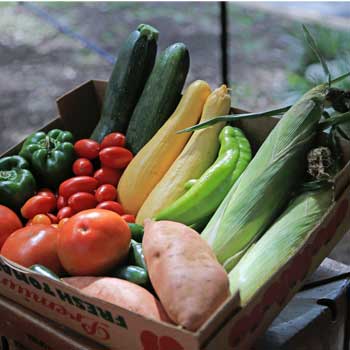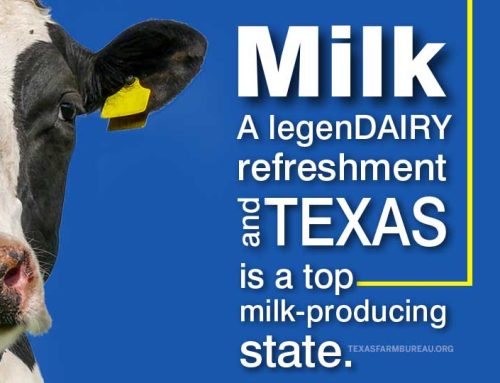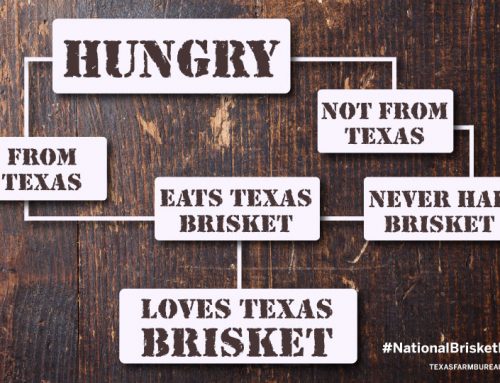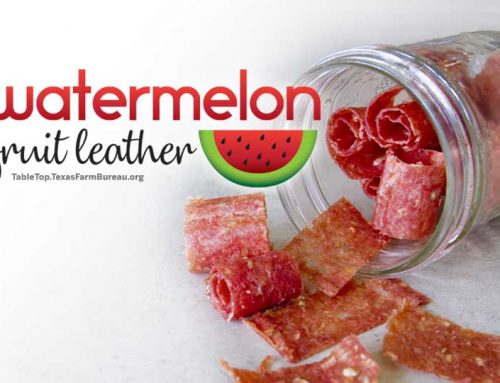By Amanda Hill
Is organic food healthier? That’s a question I hear a lot these days.
Pop culture touts that organic food is healthier. With magazine articles cursing the “12 dirtiest foods” and talk shows highlighting food extremists, it’s easy to think that organic is the only healthy choice for you and your family.
That’s not true, according to a study from Stanford University’s Center for Health Policy.
The study, published this week in the Annals of Internal Medicine, found that organic produce, meat and milk do not provide any notable health benefits over the same products grown through conventional agricultural practices.
Organic foods are no more nutritious than foods grown by conventional farmers. And, when it comes to food safety, organic and conventional products are at risk for the same contaminants. Organic products are just as susceptible to bacteria like E. coli and salmonella. Fortunately, the bacteria will be killed with proper preparation and cooking.
Those who are passionate about buying organic products will continue to evangelize the benefits they see.
They certainly will bring up concerns with pesticide residue on conventionally grown fruits and vegetables. Pesticide residue is found on organic produce, too. Whether conventional or organic, Stanford researchers found that all samples fell within the safe levels set by the Environmental Protection Agency.
They also will point out that antibiotic-resistant bacteria are less likely in organic chicken and pork. Again, the bacteria will be eliminated during cooking. But, if you feel more comfortable buying organic meat, that is your choice.
That’s the beauty of America. We have the luxury of choice. Shoppers vote with their wallets, and organic is big business.
But you shouldn’t feel guilty if you aren’t willing—or able—to pay more for organic milk, peaches or ground beef. Conventional food is just as nutritious.
Don’t let pop culture convince you otherwise.











I love the whole freedom slant that basically says that you have the freedom to be dumb and waste money on organic food if you want to.
On a strictly nutritional fact type comparison, it may be true that organic grown produce doesn’t have more vitamins or minerals than it’s pesticide and synthetic fertilizer grown cousin. However, it seems that for every study showing this, there is another one showing that organic is more nutritious. I wish scientists with findings of both sides would get together and figure this out.
Regardless, even if the nutrition is the same, how the food was created is vastly different. Conventionally grown food uses vastly more resources than organic; fertilizers, insecticides, fungicides, herbicides, use oil to create them, and oil to ship them to the farmer. Organic uses much less.
Is it possible that some organic produces has pesticide residues? Certainly, but this was not through the action of the organic farmer(they can’t spray synthetic pesticides), but via the environment itself. Organic food is never as high in the # of pesticides found, nor the amount of residue found.
People then say well if organic produce can have pesticide residue on it, then why bother? Well, if you had the choice between eating a strawberry with 7 residues of pesticides found on it, or 1, which would you choose?
As for what “safe” levels of pesticides are, I guess I have to look to history to see the chemicals that were once thought were safe; DDT, tobacco, Agent Orange, CFC’s, etc. Time will only tell how safe roundup, 2-4-D, & GMO’s are, but it is a safe bet that if you don’t use them, you can’t get hurt by them.
For me, I’d rather put my money into farmers that are doing everything they can to create safe food for me to consume, and not just have profit as the prime motivator. Organic isn’t perfect, but it is a better choice IMO.
Thank you for your comment, Dean. We may never agree on this issue, but I’m particularly disappointed that you felt I was portraying a condescending attitude toward people who choose to buy organic food. That was not – and will never be – my intention or tone. It is a choice. Just as it is my choice to buy food that I feel comfortable eating.
I stand by farmers who grow their crops using methods that have been scientifically-tested and vetted by some of the most experienced and intelligent experts in our nation. And, the beauty of the American market is we all have the freedom to think, say and buy what we want – including our food. I’m thankful to live in a country where we can do so.
Oh, and I’m also grateful for the men and women who grow healthy, nutritious produce, milk and meat that I can afford to buy for myself and my family.
Thanks for the comments Amanda. I reread your article and I am sorry but it is very easy to conclude that you were being condescending to consumers who believe in the organic system with your use of the terms “pop culture”, “food extremists”, “evangelize the benefits” . But hey, if that was not your intention, my mistake!
I guess we have a difference of opinion to the definition of what “healthy” and “safe” is.
If you feel that you want to eat strawberries grown by a “health conscious” farmer that is laced with 8 different pesticides residues, that are deemed “safe”, all the power to you, I am glad you have the freedom to do so.
Personally, I prefer a food system that does not use pesticides, that takes into account the health of the soil, the air, the water and thus makes choices that are morally the right thing to do instead of financially the right thing to do.
I am grateful for the men and women organic farmers who are just scraping by because their morals cannot be bought by the almighty dollar. These farmers can go to sleep at night knowing that they have done everything in their power to protect the health of the consumer and the environment. Honestly, can the strawberry grower who sprays 8 different types of pesticides do the same thing?
The pesticides used on conventional crops have been tested, over and over, and are safe to use in farming. The many farmers I’ve been privileged to meet and work with are not greedy, money-hungry people who will harm their customers for an extra buck. They take great care and pride in their businesses, and they use methods that are both approved and effective in growing.
I appreciate the conversations here on Texas Table Top. That’s what we’re here to do – allow a place for all viewpoints to be presented and discussed, even if we don’t share the same perspectives or opinions.
Perhaps more research into how the Stanford study was done is needed. I say follow the money when study results hit the media about some great new breakthorugh info that challenges our common sense. ???? Chances are someone stands to profit and it isn’t usually the general public!
….check out this commentary on the study….
http://www.naturalnews.com/037175_Stanford_organic_food_study_fraud.html
PC, thanks for your comment. The Stanford study was an evaluation of previously collected data through 237 research studies. Scientists are trained to evaluate and cull data for validity, including collection methods and processes. Stanford scientists and researchers are among the best in the world. I trust their research methods, as I believe many Americans do.
This is a polarized issue, no question about it. However, the commentary on the study was written by Natural News, a pro-organic website. It makes sense that this is their opinion of the Stanford study.
“However, the commentary on the study was written by Natural News, a pro-organic website. It makes sense that this is their opinion of the Stanford study.”
Amanda, how can you have a debate if you don’t actually listen to what the other side has to say? So, because this opinion came from someone who is opposite the side you support, you completely ignore it?
It’s pretty hard to have a discussion when you dismiss all views that don’t align with yours.
Dean, does it not make sense that Natural News would not agree with the Stanford study? I would be surprised if they did.
I’ve been following Natural News for several years and I’m impressed with their news articles and their investigative research. They aren’t a main-stream news media outlet and they do support alternative and natural thinking but I wouldn’t discount their reporting. They do raise some questions that beg to be investigated further.
There are usually two sides to every story –digging deeper into what we are told or what we hear, no matter WHAT the source, is always a good idea. The Stanford study might be correct–but for some reason that bell just didn’t ring right to my ears. So I will reserve judgement and hold out for more research using controlled situations, in the meantime, I’ll eat organic as often as I can. Have a great day all.
PC, I appreciate you providing another perspective from Natural News. I did read the Natural News commentary in its entirety when you posted it. Personally, I disagree with Mr. Rappoport’s belief that the Stanford study is invalid because it studied data collected from previous research. However, I completely agree that more research should be done on this subject – especially to put everyone’s mind at ease about the food we eat.
I would buy as much organic as possible because I don’t care for genetically altered/engineerd food – that just seems strange to me. I think it’s sad that if one were to want to try and eat healthier it’s so costly…but all the pre-packaged foods and junk is so much cheaper…that just doesn’t make sense to me. But alot of things in this day and age don’t. I am also hesitant at being ok with what the EPA deems “ok” to ingest and have sprayed on food – or the way it’s engineered and the growth hormones and things of that nature.
One way to eat healthy while keeping costs down is to buy produce in season. I was at a farmers market yesterday in Fort Worth and saw some beautiful tomatoes and squash. I also took home a basket full of peaches. The price was right, too! And, when it comes to grocery shopping, I try to buy as many fresh items as I can, rather than pre-packaged. My family prefers homemade meals anyway.
Thanks for your comment, Angie. Hope to see you around here again soon.
I, too, perceived the author of this article to be somewhat condescending and frankly, a little defensive. Yes, depending on one’s personal finances and what is available in one’s town, one can choose, or not choise, to purchase organic foods. I routinely purchase what I can not only because I want to reduce my family’s exposure to pesticides, inorganic fertilizers, antibiotics and hormones, but because I see the much more widely reaching effects of non-organic, non-sustainable food production. This is never discussed in any of the articles I have read about this particular study. Yes, food across the board whether organic or otherwise, basically has the same nutritional value. They way it is raised, however, has a very different effect on our land and its resources and frankly, that’s the real issue.
Thanks for your comment, A Rancher’s Daughter. I apologize if my tone came across as condescending. That certainly was not my intention, and I’ll be mindful of it in my future posts. Irresponsible use of pesticides and fertilizers is not acceptable, and farmers work to find ways to use only as much as is needed to grow their crops, and nothing more. The environment is farmers’ most important tool. It’s in their best interests, and their responsibility, to protect it.